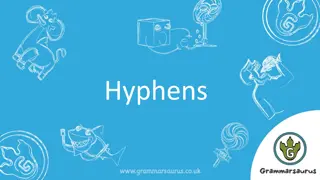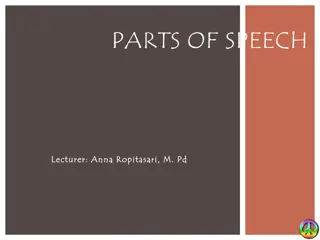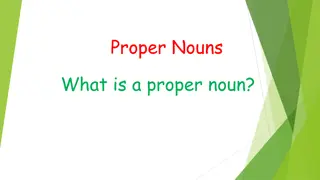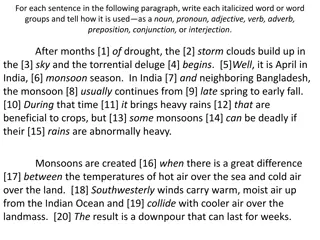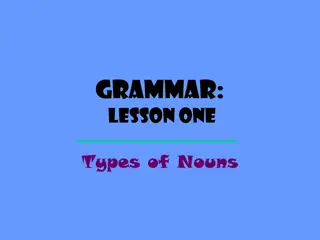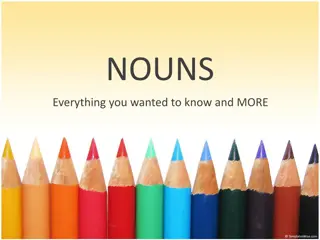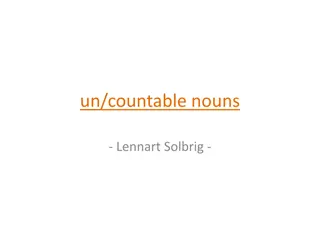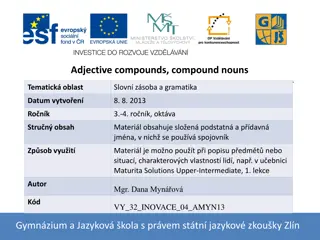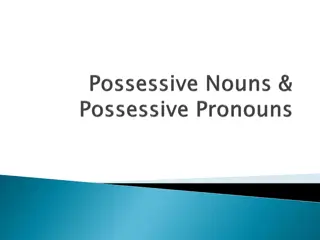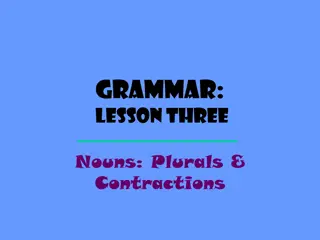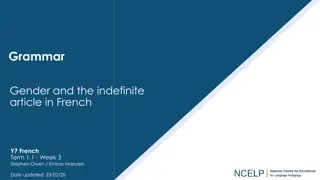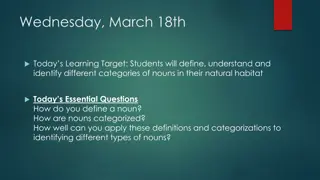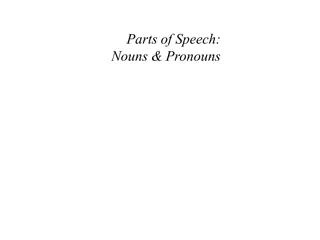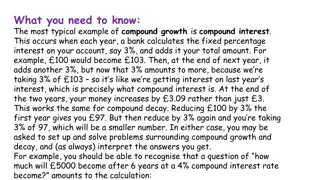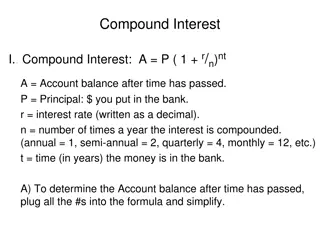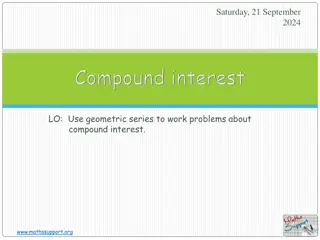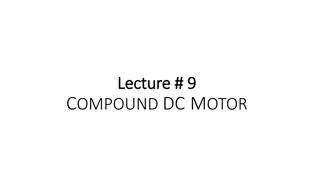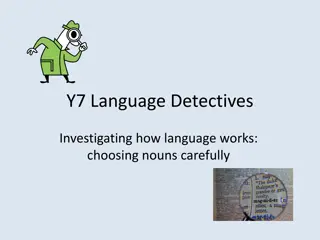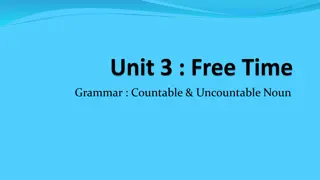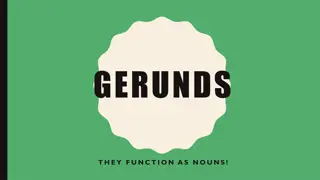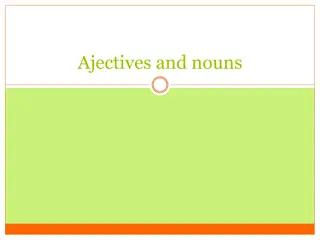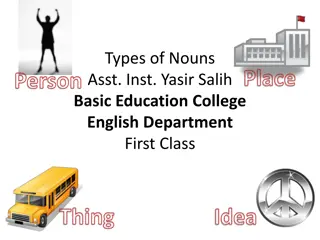Mastering the Use of Hyphens in Compound Adjectives
Hyphens play a vital role in creating compound adjectives by joining words together to form longer descriptive phrases. This guide provides tips on identifying, using, and creating compound adjectives with hyphens to enhance your writing skills. Discover the importance of hyphens in maintaining clar
0 views • 8 slides
Understanding Parts of Speech: Nouns and Pronouns Overview
Dive into the world of nouns and pronouns with this detailed guide covering definitions, examples, and practice exercises on common nouns, proper nouns, and different types of pronouns such as personal, demonstrative, and interrogative pronouns.
1 views • 19 slides
Sentence Structures: Simple, Compound, Complex, and Compound-Complex
Learn about the different types of sentence structures - simple, compound, complex, and compound-complex - through examples and definitions. Understand the components of clauses and sentences, including independent and dependent clauses, to enhance your understanding of English grammar.
2 views • 11 slides
Understanding Adjectivals in Noun Phrases: A Comprehensive Guide
Adjectivals, including determiners, adjectives, and nouns, play crucial roles in modifying nouns within noun phrases. This guide explores the different types of adjectivals, their positions within a phrase, the use of pre-headword modifiers such as determiners, and the order of adjectives and nouns.
1 views • 40 slides
Understanding Proper Nouns: Names of People, Places, and Things
Proper nouns are special nouns that specify particular people, animals, or places. They always start with a capital letter and help identify specific entities. Examples include names of individuals such as Sami, Carol, or Elliot, as well as places like the National Orthodox School. Recognizing and c
0 views • 5 slides
Understanding Compound Interest in Class VIII Mathematics
In this chapter, students will learn about simple interest and compound interest, memorize their formulas, derive compound interest formula from simple interest concept, calculate compound interest with different compounding frequencies, understand growth and depreciation concepts, and derive formul
1 views • 29 slides
Understanding Nouns: Types and Examples
This content delves into the different types of nouns, such as common and proper nouns, concrete and abstract nouns. It also provides examples and explanations on how nouns can be used in sentences. Gain insights on nouns as you explore this informative piece.
0 views • 24 slides
Understanding Types of Nouns: Common, Proper, Concrete, and Abstract
This educational content delves into the different types of nouns, including common nouns that refer to general entities, proper nouns that denote specific names, concrete nouns that are tangible, and abstract nouns representing intangible ideas. Explore examples and classifications to enhance your
0 views • 14 slides
All About Nouns: Types, Rules, and Examples
Explore the world of nouns - words that name people, places, things, or ideas. Learn about singular/plural, common/proper, concrete/abstract nouns, possessive/collective nouns, and rules for making singular nouns plural with helpful examples.
1 views • 22 slides
Understanding Nouns and Abstract Nouns: Identification and Formation
Explore the world of nouns, including proper nouns and collective nouns. Learn to identify and correctly write proper nouns and match collective nouns with their respective groups. Discover abstract nouns and how to create them by adding "-ness" to words. Enhance your writing skills with these funda
0 views • 107 slides
Understanding Nouns: Types and Examples
Explore the concept of nouns, the basic building blocks of sentences, and learn about different categories such as common and proper nouns. Witness how nouns represent a wide range of things and enhance your communication skills by mastering various nouns in English.
0 views • 19 slides
Understanding Countable and Uncountable Nouns
Countable nouns have singular and plural forms and can be used with articles like "a" and "the," while uncountable nouns have only one form and cannot be quantified with numbers. Countable nouns can stand with numbers or articles, while uncountable nouns can be used with specific words like "some" o
0 views • 16 slides
Learn Adjective Compounds and Compound Nouns
Improve your understanding of adjective compounds and compound nouns through matching exercises and translations. Practice using two-word adjectives and answer questions related to personal experiences. Utilize provided resources for further learning.
0 views • 6 slides
Grammar Warm Ups Lessons 16-20: Parts of Speech - Nouns
Learn about nouns as parts of speech in Lessons 16-20 of the Grammar Warm Ups series. Explore the definition, examples, and identification of nouns, including common and proper nouns. Improve your grammar skills with exercises highlighting different types of nouns.
0 views • 11 slides
Understanding Possessive Nouns and Pronouns in English Grammar
Explore the usage of possessive nouns and pronouns in English grammar through examples of singular and plural possessive forms. Learn how possessive pronouns replace possessive nouns to indicate ownership effectively in sentences. Enhance your understanding of forming possessive constructions and ap
0 views • 10 slides
Understanding Plural Nouns in English Grammar
Exploring the rules for forming plural nouns in English, from adding "s" to special cases like words ending in "s," "ch," "sh," "x," or "z." Learn how to modify nouns ending in vowels or consonants, as well as irregular plural forms and compound words. Enhance your grasp of English grammar with prac
0 views • 16 slides
Understanding Stress in Compound Words for English Pronunciation
Explore the rules of stress placement in compound words in English pronunciation. Learn how stress can shift based on word combinations and types. Discover the differences in pronunciation between compound words, adjectives, nouns, and verbs for accurate spoken English.
0 views • 4 slides
Understanding Parts of Speech in English Language
This content delves into various aspects of parts of speech in the English language, covering sentences, phrases, and clauses. It discusses the use of adjectives, nouns, pronouns, verbs, adverbs, prepositions, conjunctions, and interjections, providing examples and explanations. Additionally, it exp
0 views • 33 slides
Understanding Countable and Uncountable Nouns
Learn the difference between countable and uncountable nouns, how to identify them, and when to use "a" or "an" with countable nouns. Discover examples of countable and uncountable nouns and how to ask about quantities. Improve your English grammar knowledge to enhance your writing skills.
0 views • 13 slides
Gender and the Indefinite Article in French
In French, nouns have genders (masculine or feminine) and are accompanied by definite articles (un or une) based on their gender. Learning the gender of nouns is essential as it cannot be guessed from the meaning or appearance. The indefinite article "a" is represented by un for masculine nouns and
0 views • 12 slides
Understanding Singular and Plural Nouns
Singular and plural nouns can sometimes be confusing, but this guide clears up common misconceptions. Learn when to use plural nouns for singular items, how certain nouns can be singular or plural, and when to use singular or plural verbs with specific nouns like sports teams or companies. Recognize
0 views • 9 slides
Understanding Nouns: Types, Examples, and Usage
Exploring the concept of nouns, this content covers the definition of a noun, classifications such as material, compound, proper, common, abstract, and collective nouns. It also includes exercises on filling in blanks with appropriate nouns and distinguishing proper nouns from common nouns with exam
0 views • 18 slides
Understanding Nouns: Definitions, Categorization, and Examples
Explore the world of nouns by defining, categorizing, and identifying different types such as common, proper, and abstract nouns. Enhance your understanding through examples and practice exercises. Uncover the essence of nouns as they represent people, places, things, and ideas.
0 views • 20 slides
Understanding Nouns and Pronouns in Grammar
Explore the concept of nouns and pronouns in grammar through examples and explanations. Learn about the different types of nouns, such as singular, plural, and collective nouns. Discover how compound nouns are formed and their usage in sentences.
0 views • 42 slides
Understanding Nouns and Pronouns in Grammar
Dive into the world of nouns and pronouns with this comprehensive guide. Learn about different types of nouns such as concrete, abstract, collective, and compound nouns. Explore the distinction between common and proper nouns. Discover the role of pronouns as words that substitute for nouns, includi
0 views • 7 slides
Nouns of II Declension in Latin Grammar
Learn about the nouns of the second declension in Latin grammar, including the different forms of masculine, feminine, and neuter nouns, along with exceptions and examples. Explore the system of endings, Greek nouns of the second declension, and suffixes used in this declension.
0 views • 21 slides
Understanding Compound Subjects in Grammar
Compound subjects joined by "and" usually require plural verbs, while compound subjects joined by "or," "nor," "either or," or "neither nor" may be singular or plural depending on the subject closest to the verb. Recognizing when to use singular or plural verbs with compound subjects is essential fo
0 views • 5 slides
Understanding Compound Growth and Decay Through Examples
Compound growth and decay, specifically compound interest, involve calculating interest on a changing total amount over time. This concept is illustrated through various examples and equations, showcasing how investments or values increase or decrease with each period. Learn how to solve problems re
0 views • 9 slides
Understanding Compound Interest Formulas and Examples
Compound interest is a powerful concept in finance that calculates the growth of an investment over time. This summary explains the formula for compound interest, how to calculate account balances and interest earned, and examples for various scenarios. You'll also learn how to solve for the princip
0 views • 7 slides
Understanding Compound Interest: A Practical Guide
Compound interest is a powerful financial concept that can significantly impact your savings and investments. This guide explains how compound interest works using geometric series and provides a step-by-step solution to a compound interest problem. Learn about the types of interest, the difference
0 views • 26 slides
Comparison of Compound DC Motors and Their Characteristics
Compound DC motors, including cumulative, differential, and compound configurations, offer unique operational features based on how the series and shunt field windings are connected. Cumulative compound motors provide improved torque characteristics but lower speed, while differential compound motor
0 views • 12 slides
Understanding Countable and Uncountable Nouns
Countable nouns are items that can be counted individually, such as "bananas," while uncountable nouns, like "rice," cannot be counted in the same way. Learn how to use "how much" and "how many" for different types of nouns, and when to use "some" and "any" in sentences. Also, understand when to use
0 views • 20 slides
Comprehensive Review Questions on Verbs and Nouns
Explore a detailed PowerPoint presentation filled with review questions and answers on verbs and nouns. Take your time to go through the slides and engage with essential questions about different types of verbs and nouns. Enhance your understanding of abstract nouns, pronouns, and collective nouns w
0 views • 37 slides
Exploring the Use of Nouns in Fiction Writing
Investigating how writers use nouns to vividly describe characters and settings in fiction, this content delves into the impact of carefully chosen nouns in creating engaging narratives. Examples from well-known works like "Harry Potter" and "Poison" illustrate the importance of proper and common no
0 views • 7 slides
Understanding Countable and Uncountable Nouns in Grammar
Explore the differences between countable and uncountable nouns in grammar with examples. Learn how to form plural forms of countable nouns and understand the concept of uncountable nouns. Enhance your grammar skills by mastering the usage of articles and quantifiers with both types of nouns.
0 views • 80 slides
Understanding Nouns and Their Functions in Sentences
Gerunds function as nouns in sentences and can serve various roles such as subjects, direct objects, and predicate nouns. Nouns act as the subject of a sentence, telling who or what the sentence is about. By identifying the subject in sentences, you can understand its role and importance in conveyin
0 views • 22 slides
Understanding Parts of Speech in English Grammar with Dr. David Odoi
Dive into the fundamental aspects of English Grammar with Dr. David Odoi at the Language Centre. Explore Nouns, Pronouns, and Verbs while learning about the different types of nouns such as Proper, Common, Collective, Concrete, and Abstract nouns. Understand countable and uncountable nouns and their
0 views • 37 slides
Understanding Adjectives and Nouns: Gender, Form, and Declension
Learn how to connect nouns with adjectives by considering gender, form, and declension. Understand the importance of matching genders and cases, and practice with examples. Explore paradigms for different adjectives and nouns, declining them accordingly. Enhance your language skills in forming corre
0 views • 12 slides
Understanding Nouns in English Language
Nouns are words used to refer to people, animals, objects, substances, events, ideas, and feelings. This includes proper nouns which name specific entities and common nouns that represent general terms. Additionally, collective nouns denote groups of entities. Examples such as Ruma, Sopna, Dhaka, Lo
0 views • 16 slides
Understanding Different Types of Nouns in English Language
Explore the diverse world of nouns, including common vs. proper nouns, concrete vs. abstract nouns, and human vs. non-human nouns. Learn how to differentiate between them and understand their unique characteristics through visual examples and explanations.
0 views • 14 slides
